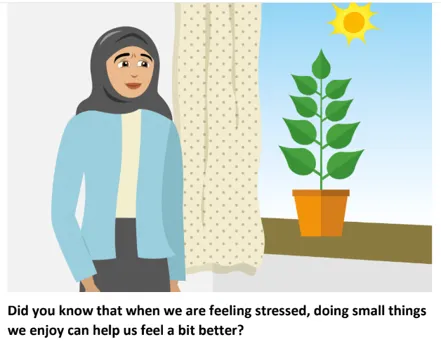Impact Case Study: Evidencing the scale-up of a digital mental health intervention for depression

Background
Mental health conditions are usually unprioritised and often go untreated in humanitarian crises. In Lebanon, there is a high prevalence of common mental disorders (eg, depression) among Lebanese and Syrian refugee populations, yet treatment remains out of reach for many. Digital interventions could offer a lower cost and accessible solution, but their effectiveness in LMICs remains understudied. The World Health Organization (WHO), the National Mental Health Programme (NMHP) at the Ministry of Public Health Lebanon and other partners worked together to create Step-by-Step (SbS), a digital self-help intervention for adults with depression.
The study
The study tested SbS in Lebanon with Syrian refugees, alongside a parallel trial with the Lebanese population (supported by Fondation d’Harcourt). Development occurred over several years, with extensive user input and formative research informing the development. Accessible via an app or website, the intervention was delivered through illustrated narrative stories with brief remote guidance from ‘e-helpers’. The study aimed at strengthening the evidence base for digital mental health interventions in humanitarian settings across LMICs. Further aims were for the results to inform whether WHO should release it as a global public good based on results from the two studies, and its potential for nationwide scale-up.
The study’s success was driven by strong government support, a dedicated research team, and stable funding for infrastructure and content development.
Findings and impact
- 614 beneficiaries in Lebanon received support, and beyond this a further 4,065 people have been supported by SbS to date.
- The study provided evidence on SbS’ effectiveness and scalability in humanitarian settings, leading to its integration into Lebanon’s national mental health system.
- Cost-effectiveness was demonstrated, informing policymakers and implementers of its financial and operational feasibility.
- The research has shaped future investments and innovations in digital mental health.
Lessons learnt
- Allow sufficient time for the development of digital interventions
- Government buy-in established from the outset cemented uptake
Partners
ABAAD, Embrace, Freie Universität Berlin, International Medical Corps Lebanon, National Mental Health Programme (NMHP) of the Ministry of Public Health Lebanon, Saint Joseph University Lebanon, UNHCR Lebanon, University of Zurich, Vrije Universiteit (VU) Amsterdam, World Health Organisation (WHO)
Methodology
R2HC captures detailed case studies through a process that triangulates and validates evidence on uptake and impact. The case study methodology and full version of this summary case study including references are available on request. Outputs and resources from this study are available on the project page.